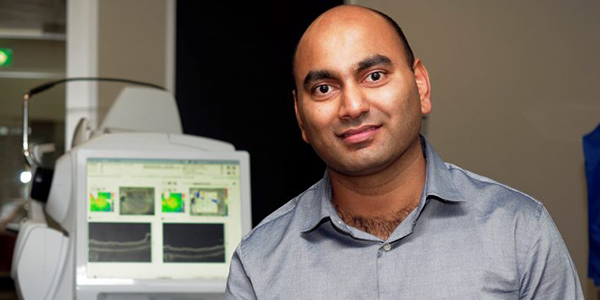1:30min
 Dr Ranjay Chakraborty
Dr Ranjay Chakraborty
By Helen Carter
Journalist
People with myopia are more likely to experience poorer sleep quality than people with normal vision, a small Australian study suggests.
The study, led by Adelaide optometrist Dr Ranjay Chakraborty, indicates that myopes have more delayed circadian rhythms and lower production of melatonin, a hormone secreted in the brain and responsible for regulating sleep at night, than emmetropes.
Dr Chakraborty is Senior Lecturer and Course Coordinator, Optometry and Vision Science in the College of Nursing and Health Sciences, Flinders University. Acting Head, School of Optometry and Vision Science, QUT, Professor Michael Collins from the Contact Lens and Visual Optics Laboratory, was a co-author.
Findings from the small study suggest a potential association between circadian rhythms and myopia.
Published in Sleep, the research shows that people with myopia take longer to fall asleep, sleep for shorter periods of time at night and are more likely to go to bed later or be ‘night owls’ compared with those who have normal sight.
These sleeping habits were related to myopes spending more time on computers and other digital devices or studying before going to bed.
Optimal sleep is good for vision
Dr Chakraborty said the study added to the growing evidence of the potential association between disruption of the circadian rhythm and the development of myopia.
‘Disruptions in circadian rhythms and sleep due to the advent of artificial light and the use of light-emitting electronic devices for reading and entertainment has become a recognised health concern in several fields, but its impact on eye health has not been studied extensively,’ he said.
‘These findings provide important evidence that optimal sleep and circadian rhythms are not only essential for general health, but also for good vision.’
In the study, conducted in collaboration with the Flinders University Adelaide Institute for Sleep Health, the circadian timing and production of melatonin was measured in myopes and emmetropes through saliva and urine samples. All were university students, aged in their twenties.
Myopes had significantly delayed circadian rhythms and significantly lower outputs of melatonin compared with normal sighted participants.
Dr Chakraborty said children’s sleeping habits and exposure to screen time should be re-evaluated to reduce the chances of myopia progressing in young people.
‘A lot of digital devices emit blue light, which can suppress the production of melatonin and cause delay in circadian rhythms at night, resulting in delayed and poor sleep,’ he said. ‘It is important to limit exposure to digital devices in children, particularly at night, for ensuring good sleep and healthy vision.
‘As a next step, we would like to examine circadian rhythm timing, total production of melatonin sleep and light exposure at night in young children – the actual target population for myopia prevention.
‘Such a study would provide novel insights into the biological and environmental factors underlying myopia, which will aid in early diagnosis and treatment of myopia in children.’
This week is Brien Holden Vision Institute’s global Myopia Awareness Week.
Tagged as: Myopia